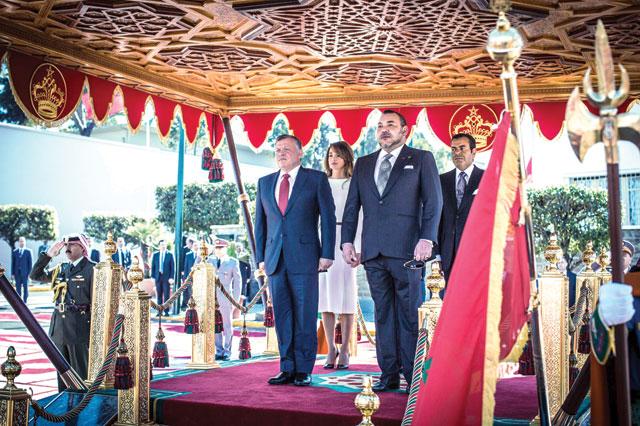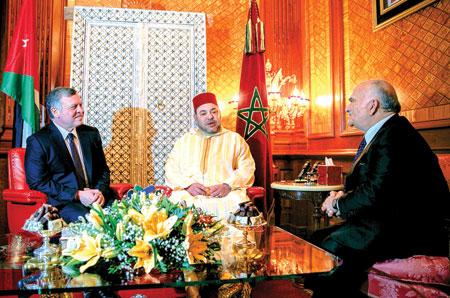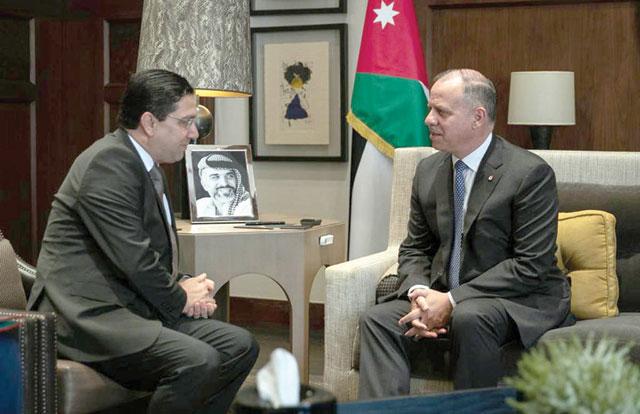You are here
Jordan, Morocco set to increase cooperation
By JT - Mar 11,2015 - Last updated at Mar 11,2015

AMMAN – His Majesty King Abdullah on Wednesday held talks with King Mohammed VI in Casablanca which focused on fostering the “deeply-rooted and brotherly” Jordanian-Moroccan ties, and addressed ways to activate cooperation in various fields.
Talks also addressed developments at regional and international levels, according to a Royal Court statement.
At the conclusion of the meeting, the two sides issued a joint communiqué that outlined steps to be taken to increase cooperation.
The communiqué said King Abdullah’s visit to Morocco came upon an invitation from the Moroccan monarch as part of their commitment to strengthening relations and continuing with their ongoing consultations and coordination, adding that the talks were based on this mutual understanding.
In this context, the two leaders directed their respective governments to prepare cooperation programmes to be endorsed during the Joint Higher Committee’s fifth session meetings that are scheduled to be held in Morocco this year.
Moreover, King Abdullah renewed Jordan’s support for the territorial integrity of Morocco.
He expressed his support for the Moroccan proposal on autonomous rule to resolve the conflict over the Moroccan Sahara, which he stressed is the basis for negotiations among concerned parties. His Majesty lauded Morocco’s reform process led by King Mohammed VI who expressed Morocco’s full support for Jordan.
With regard to the two countries’ relations with Gulf states, both leaders expressed their satisfaction with the level of cooperation with the region, renewing their countries’ support for all efforts seeking to boost the security of Gulf countries.
Noting that the two countries see eye-to-eye on various issues on the political scene in Arab and Islamic countries, the two leaders stressed the importance of endeavours under way to intensify the efforts of the international community in combating radicalism and terrorism.
They also stressed the importance of unifying Arab ranks, in light of regional political and security challenges.
Regarding the Palestinian issue, the two leaders called for intensifying efforts to arrive at a comprehensive and just solution for the Palestinian cause, stressing their support for peace negotiations.
They denounced Israel’s policy to impose a new reality in the holy city of Jerusalem, seeking to change the true identity and to Judaise the holy city.
Regarding developments in Syria, they pointed out that the Syrian people are the ones to decide what is best for them in terms of political transition in accordance with the Geneva I conference.
King Mohammed VI underlined Jordan’s “huge humanitarian burden” as it hosts a great number of Syrian refugees, and called for further support for the Kingdom to pursue its humanitarian mission.
He thanked Jordan for facilitating the work of Morocco’s field hospital at the Zaatari camp for Syrian refugees.
With regard to Iraq, the two sides asserted their backing of the Iraqi government in confronting terrorist groups that seek to undermine the security of the Arab country.
As for the situation in Libya, King Abdullah commended Morocco’s hosting of dialogue that started in Rabat last week, calling on disputing parties to seize the opportunity to arrive at a political solution that paves the way for the reconstruction of Libya’s institutions.
Furthermore, the two leaders expressed concern about the dangerous developments in Yemen, calling on the disputing parties to embrace national reconciliation to ensure Yemen’s stability and security.
Upon their arrival at the royal palace in Casablanca, Their Majesties King Abdullah and Queen Rania received an official welcome that included a 21-gun salute by the artillery.
At the conclusion of the talks, King Abdullah extended an invitation to King Mohammed VI to visit Jordan.
King Abdullah also met Wednesday with Moroccan Prime Minister Abdelilah Benkirane and Lower House Speaker Rachid Talbi Alami over bilateral ties and regional developments.
Related Articles
His Majesty King Abdullah on Tuesday received a phone call from Moroccan King Mohammed VI, during which both leaders discussed the latest developments in the region.
His Majesty King Abdullah returned home on Thursday after concluding an official tour that included Morocco, Brussels and Strasbourg.
AMMAN — HRH Prince Feisal, the Regent, on Saturday received at Al Husseiniya Palace Moroccan Minister of Foreign Affairs and International C













